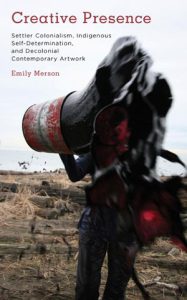Creative Presence: Settler Colonialism, Indigenous Self-Determination, and Decolonial Contemporary Artwork (Kilombo: International Relations and Colonial Questions)

Author: Emily Merson
Publisher: Rowman & Littlefield
Year of Publication: 2020 (Illustrated ed.)
Print Length: 230 pages
Genre: Non-Fiction / Social Science, International Relations, Arts & Humanities, Colonial & Postcolonial Studies
Area: Canada
Topic: Citizenship, Activism, Arts-Based Method, Art & Design, Colonialism & Post-Colonialism, Decolonization & Anti-Colonization, Indigenous & Indigeneity, Resistance, Self-Determination
Historically, artwork has played a powerful role in shaping settler colonial subjectivity and the political imagination of Westphalian sovereignty through the canonization of particular visual artworks, aesthetic theories, and art institutions’ methods of display. Creative Presence contributes a transnational feminist intersectional analysis of visual and performance artwork by Indigenous contemporary artists who directly engage with colonialism and decolonization. This book makes the case that decolonial aesthetics is a form of labour and knowledge production that calls attention to the foundational violence of settler colonialism in the formation of the world order of sovereign states.
Creative Presence analyzes how artists’ purposeful selection of materials, media forms, and place-making in the exhibitions and performances of their work reveals the limits of conventional International Relations theories, methods, and debates on sovereignty and participates in Indigenous reclamations of lands and waterways in world politics. Brian Jungen’s sculpture series Prototypes for New Understanding and Rebecca Belmore’s filmed performances Vigil and Fountain exhibit how colonial power has been imagined, visualized and institutionalized historically and in contemporary settler visual culture. These contemporary visual and performance artworks by Indigenous artists that name the political violence of settler colonial claims to exclusive territorial sovereignty introduce possibilities for decolonizing audiences’ sensibilities and political imagination of lands and waterways.
Table of Contents
Preface
Acknowledgments
List of Figures
1. Introduction: Settler Colonial Claims to Sovereignty and Decolonial Contemporary Artwork
2. Creative Presence: Tracing the Coloniality of Global Power and Decolonial World Politics through the Materials, Media Forms, and Place-Making of Contemporary Artwork
3. Unsettling International Relations: Decolonizing International Relations Theories of Global Power and Settler Colonial Claims to Exclusive Sovereignty
4. Decolonizing Settler Colonial Art Institutions: Brian Jungen’s Visual Exhibition Methods of Prototypes for New Understanding
5. Materializing Indigenous Self-Determination: Brian Jungen’s Materials and Sculptural Methods in Prototypes for New Understanding
6. The Scenario of Naming Power: Remembering Traumas of Canadian Settler Colonialism in Rebecca Belmore’s Filmed Performance Installation The Named and the Unnamed
7. International Art World and Transnational Artwork: Creative Presence in Rebecca Belmore’s Fountain at the Venice Biennale
8. Decolonial Contemporary Artwork and the Futures of Global Politics
Works Cited
Index
About the author

Emily Merson is Course Leader and Lecturer for Political Science at York University, Canada. She recieved her Ph.D. degree in Political Science from the Graduate Program in Political Science at York University in June 2015. Her commitment to decolonization in my research and teaching emerges from my position as a Canadian settler living and working in my hometown of Toronto, which is located on the lands and waterways of the Mississaugas of the New Credit First Nation and the Anishinaabe and Haudenosaunee peoples.
Source: https://www.amazon.com/Creative-Presence-Kilombo-International-Relations/dp/178552321X/
More from Emily Merson in this library, click here.
